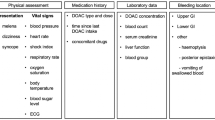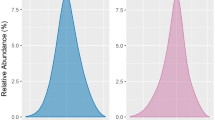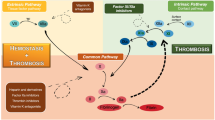Abstract
Objective: To assess etiology and impact of thrombocytopenia in a large oral glycoprotein (GP) IIb/IIIa inhibitor trial.
Background: Heparin is known to cause thrombocytopenia, and in some of these patients thrombosis. GP IIb/IIIa inhibitors are also associated with thrombocytopenia.
Methods: The Orbofiban in Patients with Unstable Coronary Syndromes (OPUS-TIMI 16) Trial randomized 10,392 patients with ACS to the oral GP IIb/IIIa inhibitor orbofiban or placebo. Patients were followed for a minimum of ten months. Thrombocytopenia was defined prospectively as a platelet count < 80,000.
Results: Thrombocytopenia was rare in the OPUS-TIMI 16 trial (0.68% at Day 30 and 0.80% at 1 year), but more common in patients treated with orbofiban (0.92%) compared with those treated with placebo (0.2%), p < 0.001. Patients who developed thrombocytopenia had higher rates of death (11.6% vs. 1.7%, p < 0.001), recurrent MI (12.1% vs. 2.8%, p < 0.001), intracranial hemorrhage (2.9% vs. 0.0%, p < 0.001), and major or severe bleeding (19.0% vs. 2.0%, p < 0.001) at 30 days (with similar results at one year).
Conclusion: Thrombocytopenia, though uncommon, was associated with orbofiban use and an increased risk of bleeding, but also death and MI. This study provides further evidence that drugs that lead to thrombocytopenia are, in a significant proportion of patients associated with thrombotic events.
Similar content being viewed by others
References
Vorchheimer DA, Badimon JJ, Fuster V (1999) Platelet glycoprotein IIb/IIIa receptor antagonists in cardiovascular disease. Jama 281:1407–1414
Giugliano R, Hyatt R (1998) Thrombocytopenia with GP IIb/IIIa inhibitors: A meta-analysis. J Am Coll Cardiol 31:185A
Huxtable LM, Tafreshi MJ, Rakkar AN (2006) Frequency and management of thrombocytopenia with the glycoprotein IIb/IIIa receptor antagonists. Am J Cardiol 97:426–429
Berkowitz SD, Sane DC, Sigmon KN, et al (1998) Occurrence and clinical significance of thrombocytopenia in a population undergoing high-risk percutaneous coronary revascularization. Evaluation of c7E3 for the Prevention of Ischemic Complications (EPIC) Study Group. J Am Coll Cardiol 32:311–319
Harrington RA, Sane DC, Califf RM, et al (1994) Clinical importance of thrombocytopenia occurring in the hospital phase after administration of thrombolytic therapy for acute myocardial infarction. The Thrombolysis and Angioplasty in Myocardial Infarction Study Group. J Am Coll Cardiol 23:891–898
Kereiakes DJ, Berkowitz SD, Lincoff AM, et al (2000) Clinical correlates and course of thrombocytopenia during percutaneous coronary intervention in the era of abciximab platelet glycoprotein IIb/IIIa blockade. Am Heart J 140:74–80
McClure MW, Berkowitz SD, Sparapani R, et al (1999) Clinical significance of thrombocytopenia during a non-ST-elevation acute coronary syndrome. The platelet glycoprotein IIb/IIIa in unstable angina: Receptor suppression using integrilin therapy (PURSUIT) trial experience. Circulation 99:2892–2900
Merlini PA, Rossi M, Menozzi A, et al (2004) Thrombocytopenia caused by abciximab or tirofiban and its association with clinical outcome in patients undergoing coronary stenting. Circulation 109:2203–2206
Cannon CP, McCabe CH, Wilcox RG, et al (2000) Oral glycoprotein IIb/IIIa inhibition with orbofiban in patients with unstable coronary syndromes (OPUS-TIMI 16) trial. Circulation 102:149–156
A comparison of aspirin plus tirofiban with aspirin plus heparin for unstable angina (1998). Platelet Receptor Inhibition in Ischemic Syndrome Management (PRISM) Study Investigators. N Engl J Med 338:1498–1505
Comparison of sibrafiban with aspirin for prevention of cardiovascular events after acute coronary syndromes: A randomised trial (2000). The SYMPHONY Investigators. Sibrafiban versus Aspirin to Yield Maximum Protection from Ischemic Heart Events Post-acute Coronary Syndromes. Lancet 355:337–345
Randomized trial of aspirin, sibrafiban, or both for secondary prevention after acute coronary syndromes (2001). Circulation 103:1727–1733
O’Neill WW, Serruys P, Knudtson M, et al (2000) Long-term treatment with a platelet glycoprotein-receptor antagonist after percutaneous coronary revascularization. EXCITE Trial Investigators. Evaluation of Oral Xemilofiban in Controlling Thrombotic Events. N Engl J Med 342:1316–1324
Bednar B, Cook JJ, Holahan MA, et al (1999) Fibrinogen receptor antagonist-induced thrombocytopenia in chimpanzee and rhesus monkey associated with preexisting drug-dependent antibodies to platelet glycoprotein IIb/IIIa. Blood 94:587–599
Billheimer JT, Dicker IB, Wynn R, et al (2002) Evidence that thrombocytopenia observed in humans treated with orally bioavailable glycoprotein IIb/IIIa antagonists is immune mediated. Blood 99:3540–3546
Brassard JA, Curtis BR, Cooper RA, et al (2002) Acute thrombocytopenia in patients treated with the oral glycoprotein IIb/IIIa inhibitors xemilofiban and orbofiban: Evidence for an immune etiology. Thromb Haemost 88:892–897
Seiffert D, Stern AM, Ebling W, et al (2003) Prospective testing for drug-dependent antibodies reduces the incidence of thrombocytopenia observed with the small molecule glycoprotein IIb/IIIa antagonist roxifiban: Implications for the etiology of thrombocytopenia. Blood 101:58–63
Bougie DW, Wilker PR, Wuitschick ED, et al (2002) Acute thrombocytopenia after treatment with tirofiban or eptifibatide is associated with antibodies specific for ligand-occupied GPIIb/IIIa. Blood 100:2071–2076
Chew DP, Bhatt DL, Sapp S, Topol EJ (2001) Increased mortality with oral platelet glycoprotein IIb/IIIa antagonists: A meta-analysis of phase III multicenter randomized trials. Circulation 103: 201–206
Du XP, Plow EF, Frelinger AL, 3rd, O’Toole TE, Loftus JC, Ginsberg MH (1991) Ligands “activate” integrin alpha IIb beta 3 (platelet GPIIb-IIIa). Cell 65:409–416
Holmes MB, Sobel BE, Schneider DJ (1999) Variable responses to inhibition of fibrinogen binding induced by tirofiban and eptifibatide in blood from healthy subjects. Am J Cardiol 84: 203–207
Peter K, Schwarz M, Nordt T, Bode C (2001) Intrinsic activating properties of GP IIb/IIIa blockers. Thromb Res 103 Suppl 1:S21–S27
Peter K, Schwarz M, Ylanne J, et al (1998) Induction of fibrinogen binding and platelet aggregation as a potential intrinsic property of various glycoprotein IIb/IIIa (alphaIIbbeta3) inhibitors. Blood 92:3240–3249
Cox D, Smith R, Quinn M, Theroux P, Crean P, Fitzgerald DJ (2000) Evidence of platelet activation during treatment with a GPIIb/IIIa antagonist in patients presenting with acute coronary syndromes. J Am Coll Cardiol 36:1514–1519
Honda S, Tomiyama Y, Aoki T, et al (1998) Association between ligand-induced conformational changes of integrin IIbbeta3 and IIbbeta3-mediated intracellular Ca2+ signaling. Blood 92:3675–3683
Schneider DJ, Taatjes DJ, Sobel BE (2000) Paradoxical inhibition of fibrinogen binding and potentiation of alpha-granule release by specific types of inhibitors of glycoprotein IIb-IIIa. Cardiovasc Res 45:437–446
Holmes MB, Sobel BE, Cannon CP, Schneider DJ (2000) Increased platelet reactivity in patients given orbofiban after an acute coronary syndrome: An OPUS-TIMI 16 substudy. Orbofiban in Patients with Unstable coronary syndromes. Thrombolysis In Myocardial Infarction. Am J Cardiol 85:491–3, A10
Peter K, Straub A, Kohler B, et al (1999) Platelet activation as a potential mechanism of GP IIb/IIIa inhibitor-induced thrombocytopenia. Am J Cardiol 84:519–524
Horstman LL, Ahn YS (1999) Platelet microparticles: A wide-angle perspective. Crit Rev Oncol Hematol 30:111–142
Warkentin TE, Hayward CP, Boshkov LK, et al (1994) Sera from patients with heparin-induced thrombocytopenia generate platelet-derived microparticles with procoagulant activity: An explanation for the thrombotic complications of heparin-induced thrombocytopenia. Blood 84:3691–3699
Author information
Authors and Affiliations
Corresponding author
Rights and permissions
About this article
Cite this article
Scirica, B.M., Cannon, C.P., Cooper, R. et al. Drug-induced thrombocytopenia and thrombosis: Evidence from patients receiving an oral glycoprotein IIb/IIIa inhibitor in the Orbofiban in Patients with Unstable coronary Syndromes- (OPUS-TIMI 16) trial. J Thromb Thrombolysis 22, 95–102 (2006). https://doi.org/10.1007/s11239-006-8669-4
Issue Date:
DOI: https://doi.org/10.1007/s11239-006-8669-4




